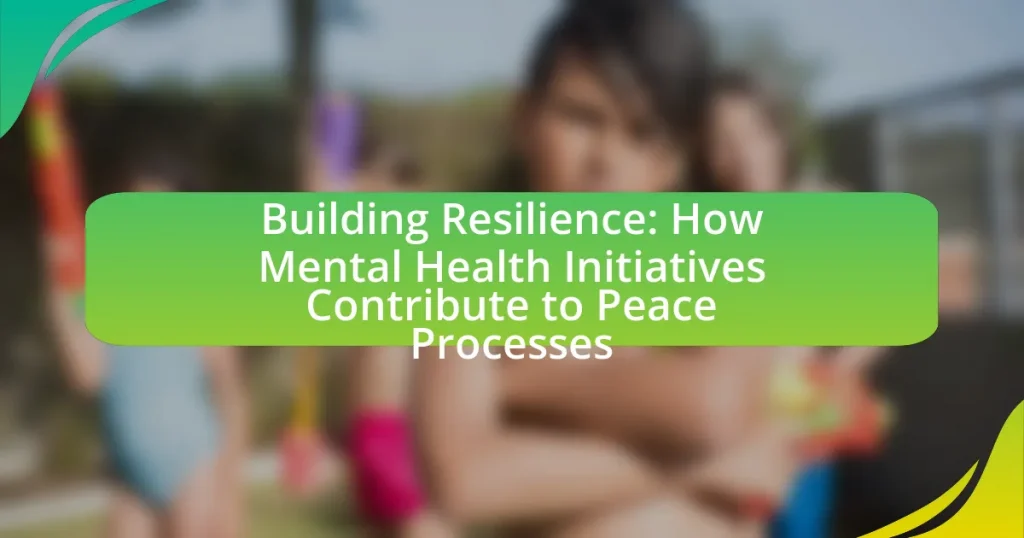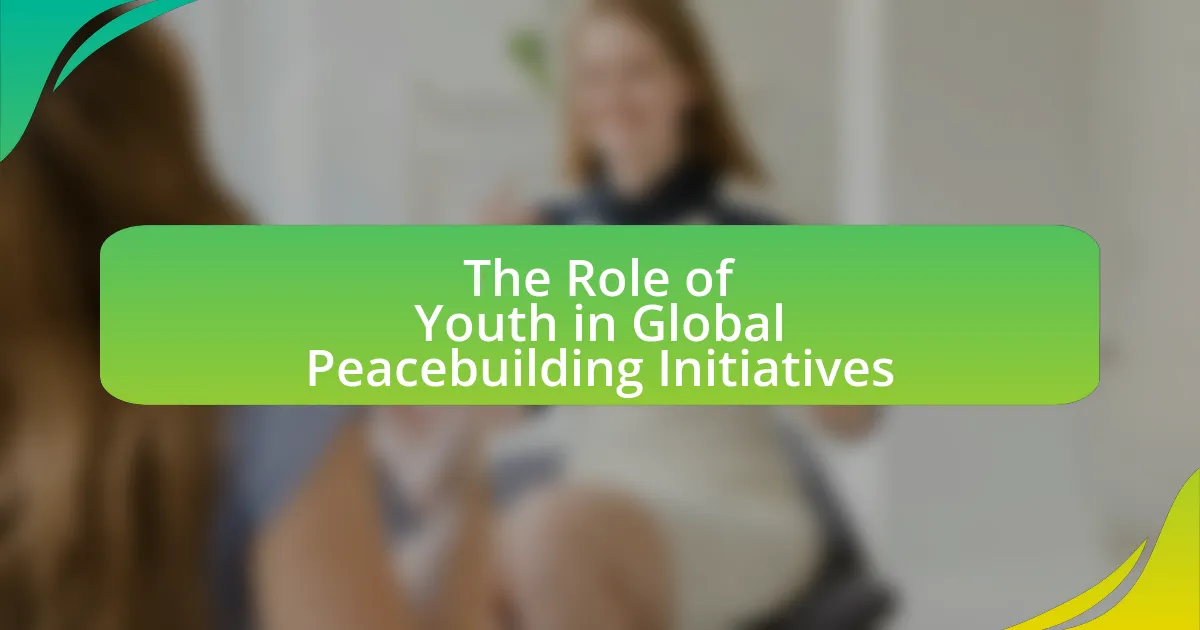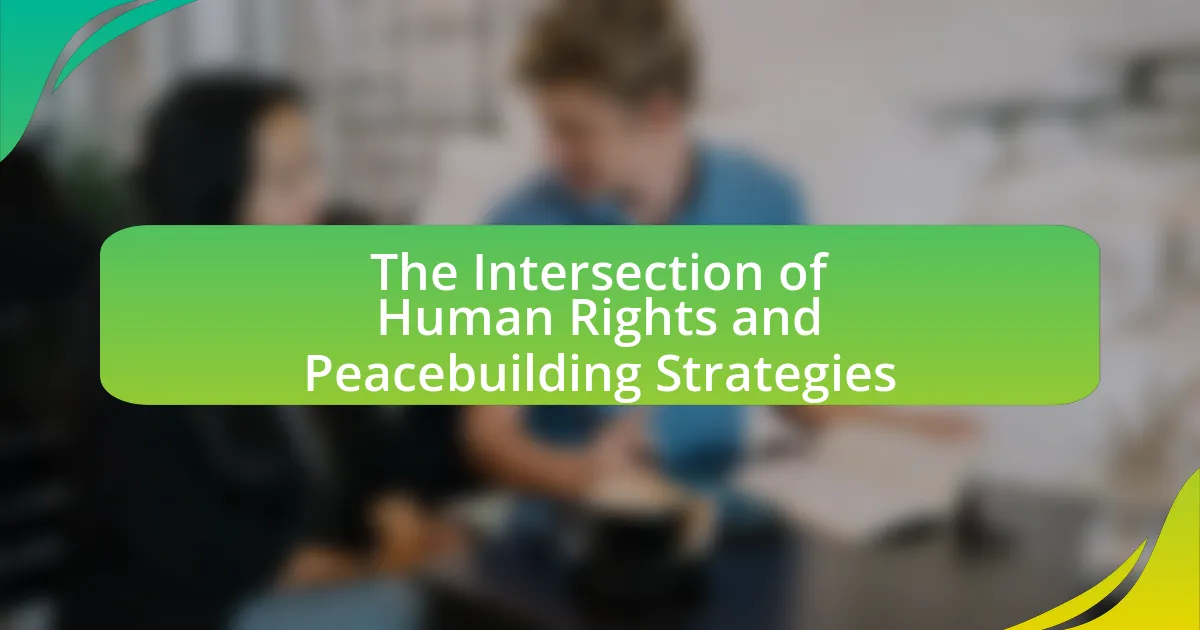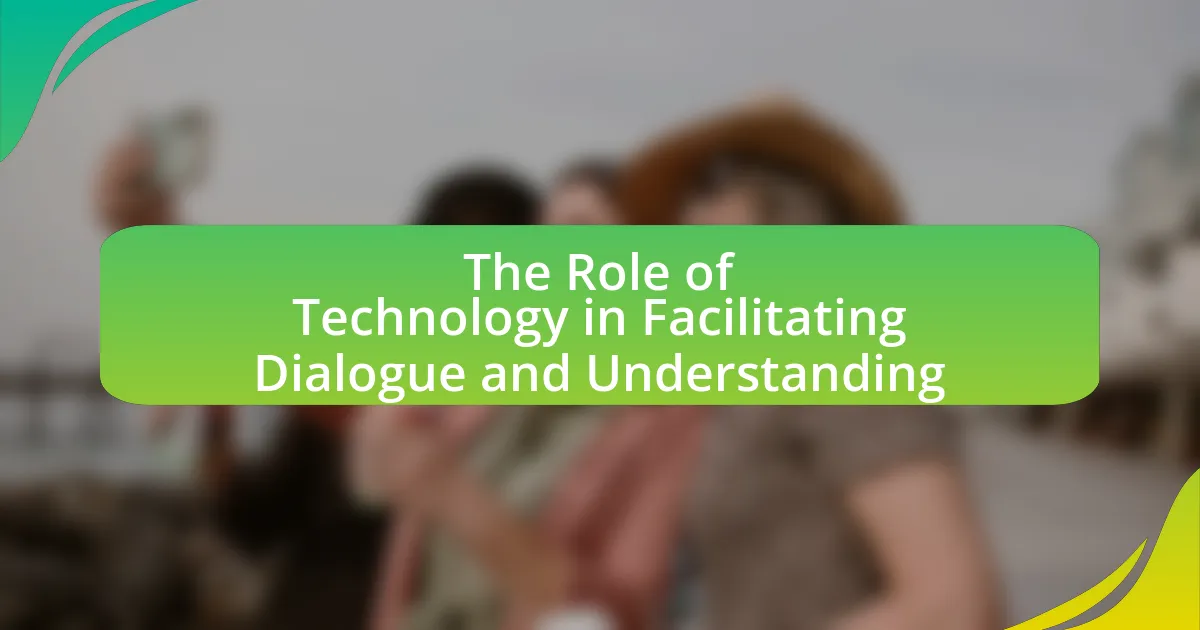The article focuses on the critical role of mental health initiatives in building resilience and supporting peace processes. It outlines how these initiatives provide essential tools and resources, such as counseling and community support, that enhance individuals’ coping mechanisms and emotional well-being. The article discusses specific strategies employed in mental health programs, their impact on individual and community resilience, and the connection between mental health support and sustainable peace. Additionally, it addresses the challenges faced by these initiatives in conflict-affected areas and highlights best practices for improving their effectiveness in fostering social cohesion and reducing violence.
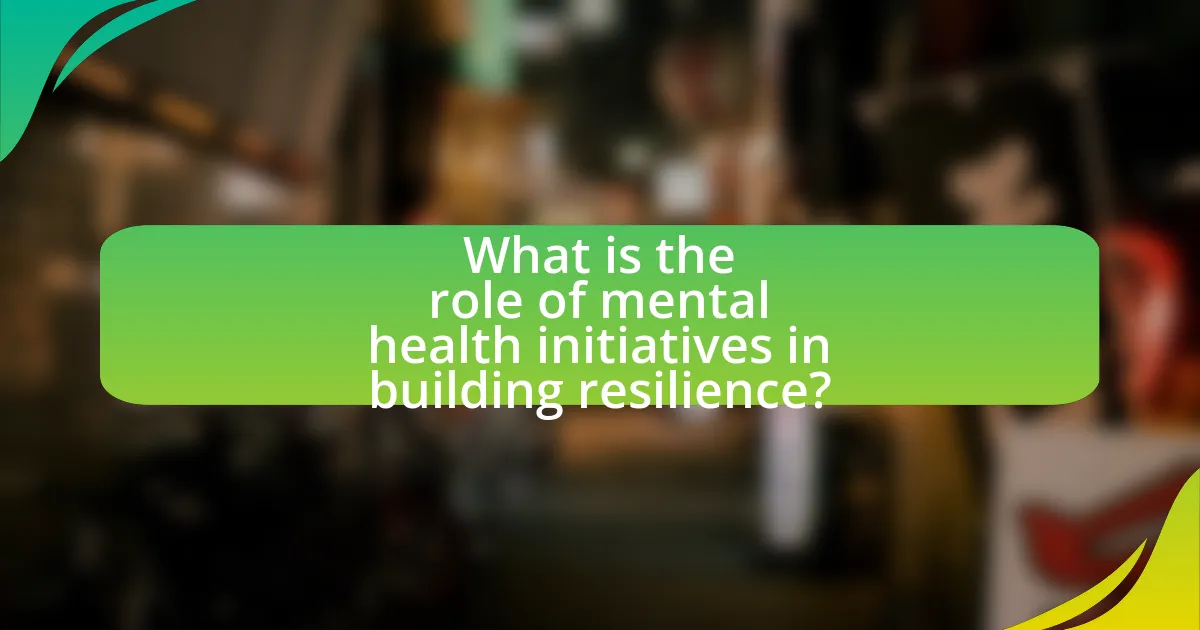
What is the role of mental health initiatives in building resilience?
Mental health initiatives play a crucial role in building resilience by providing individuals with the tools and support necessary to cope with stress and adversity. These initiatives often include access to counseling, community support programs, and educational resources that enhance emotional well-being. Research indicates that individuals who participate in mental health programs demonstrate improved coping strategies, which are essential for resilience. For example, a study published in the Journal of Mental Health found that community-based mental health interventions significantly reduced symptoms of anxiety and depression, leading to increased resilience among participants. This evidence underscores the effectiveness of mental health initiatives in fostering resilience, particularly in challenging environments.
How do mental health initiatives contribute to individual resilience?
Mental health initiatives contribute to individual resilience by providing essential support systems, resources, and coping strategies that enhance emotional well-being. These initiatives often include access to therapy, community support groups, and educational programs that equip individuals with skills to manage stress and adversity. Research indicates that individuals who participate in mental health programs report improved coping mechanisms and a greater sense of control over their lives, which are critical components of resilience. For example, a study published in the Journal of Mental Health found that participants in structured mental health interventions demonstrated a 30% increase in resilience scores compared to those who did not engage in such programs. This evidence underscores the effectiveness of mental health initiatives in fostering resilience among individuals.
What specific strategies are employed in mental health initiatives to enhance resilience?
Mental health initiatives employ several specific strategies to enhance resilience, including psychoeducation, skill-building workshops, and community support programs. Psychoeducation provides individuals with knowledge about mental health, helping them understand their experiences and develop coping strategies. Skill-building workshops focus on teaching practical skills such as stress management, emotional regulation, and problem-solving, which are essential for resilience. Community support programs foster social connections and provide a network of support, which has been shown to improve mental health outcomes and enhance resilience. Research indicates that these strategies collectively contribute to better mental health and increased resilience among individuals, particularly in contexts affected by conflict or trauma.
How do these strategies impact individuals’ coping mechanisms?
Mental health initiatives significantly enhance individuals’ coping mechanisms by providing tools and support that foster resilience. These strategies, such as cognitive-behavioral therapy and community support programs, equip individuals with skills to manage stress, regulate emotions, and navigate challenges effectively. Research indicates that individuals who engage in structured mental health programs report improved emotional regulation and a greater sense of control over their lives, which are critical components of effective coping. For instance, a study published in the Journal of Mental Health found that participants in resilience training programs demonstrated a 30% increase in adaptive coping strategies compared to those who did not participate. This evidence underscores the positive impact of mental health initiatives on enhancing coping mechanisms.
What is the connection between resilience and peace processes?
Resilience is fundamentally connected to peace processes as it enables individuals and communities to recover from conflict and build sustainable peace. Resilient populations are better equipped to manage stress, adapt to change, and engage in constructive dialogue, which are essential for reconciliation and conflict resolution. Research indicates that mental health initiatives that promote resilience can significantly enhance social cohesion and reduce the likelihood of renewed violence, as seen in post-conflict societies like Rwanda, where community-based mental health programs have contributed to long-term stability.
Why is resilience important for sustainable peace?
Resilience is crucial for sustainable peace because it enables individuals and communities to recover from conflicts and adapt to challenges. Resilient societies can effectively manage stressors, reducing the likelihood of relapse into violence. For instance, research indicates that communities with strong social networks and mental health support systems are better equipped to handle post-conflict trauma, leading to more stable environments. The World Health Organization highlights that mental health initiatives, which foster resilience, contribute significantly to peacebuilding by promoting social cohesion and reducing the risk of future conflicts.
How does individual resilience translate to community resilience?
Individual resilience translates to community resilience by fostering a collective capacity to adapt and recover from challenges. When individuals develop coping strategies, emotional regulation, and problem-solving skills, they contribute to a supportive network that enhances the overall strength of the community. Research indicates that communities with higher levels of individual resilience experience lower rates of conflict and better recovery from crises, as seen in studies conducted by the American Psychological Association, which highlight the correlation between individual mental health and community stability. This interconnectedness demonstrates that resilient individuals can inspire and uplift others, creating a more robust and cohesive community capable of facing adversity together.
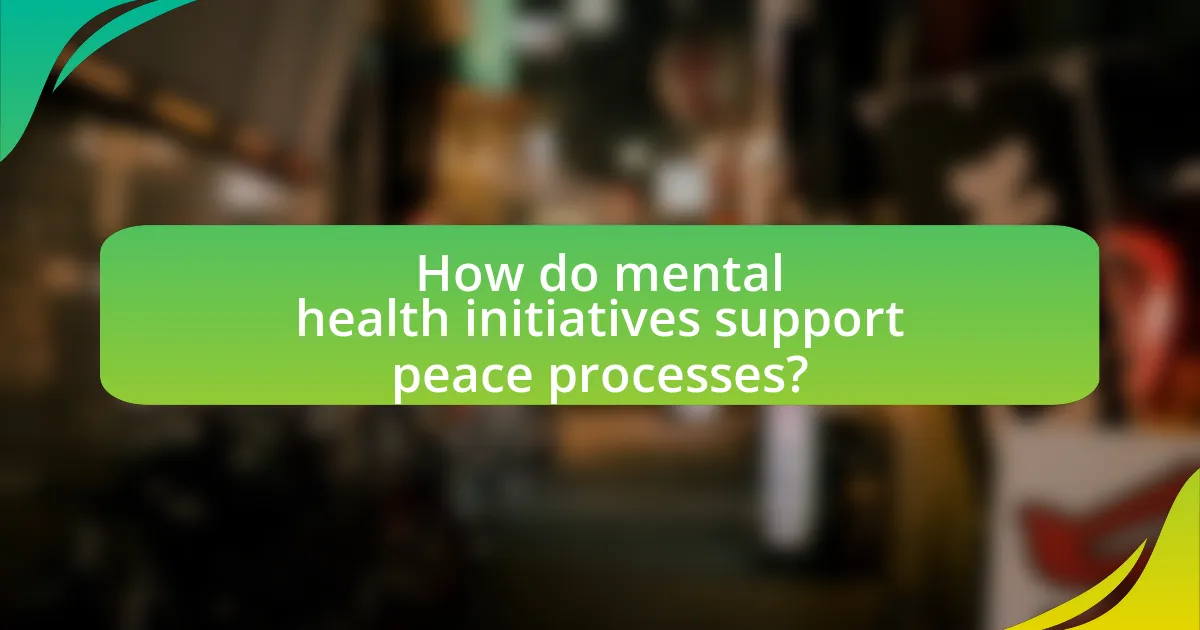
How do mental health initiatives support peace processes?
Mental health initiatives support peace processes by addressing the psychological trauma and stress that often accompany conflict, thereby fostering social cohesion and resilience. These initiatives provide critical support to individuals affected by violence, helping them to heal and reintegrate into their communities. For example, programs that offer trauma-informed care and psychological support have been shown to reduce symptoms of PTSD and anxiety, which can otherwise perpetuate cycles of violence. Research indicates that communities with access to mental health resources experience lower rates of conflict recurrence, as individuals are better equipped to manage stress and engage in constructive dialogue.
What types of mental health initiatives are most effective in conflict-affected areas?
Community-based mental health initiatives are the most effective in conflict-affected areas. These initiatives often include peer support groups, trauma-informed care, and culturally sensitive counseling services, which address the unique psychological needs of individuals impacted by conflict. Research indicates that community-based approaches can significantly reduce symptoms of PTSD and depression among affected populations, as evidenced by a study published in the Lancet Psychiatry, which found that such programs led to a 50% reduction in PTSD symptoms among participants in conflict zones. Additionally, integrating mental health services into primary healthcare systems enhances accessibility and reduces stigma, further supporting the mental well-being of individuals in these regions.
How do community-based mental health programs operate in these contexts?
Community-based mental health programs operate by integrating mental health services into local communities, focusing on accessibility and cultural relevance. These programs typically involve collaboration with local stakeholders, including healthcare providers, community leaders, and families, to identify mental health needs and deliver tailored interventions. Evidence shows that such programs can reduce stigma, improve mental health outcomes, and foster social cohesion, which are critical for peacebuilding efforts. For instance, a study published in the “Journal of Conflict Resolution” highlights that community-based mental health initiatives in post-conflict settings significantly contribute to individual and collective resilience, thereby supporting broader peace processes.
What role do international organizations play in supporting these initiatives?
International organizations play a crucial role in supporting mental health initiatives that contribute to peace processes by providing funding, expertise, and a platform for collaboration. For instance, organizations like the World Health Organization (WHO) and the United Nations (UN) facilitate the integration of mental health into peacebuilding efforts, recognizing its importance in fostering social cohesion and resilience in post-conflict settings. Research indicates that mental health support can reduce violence and promote stability; for example, a study published in the Lancet highlighted that mental health interventions in conflict-affected areas significantly improved community well-being and reduced symptoms of trauma. Thus, the involvement of international organizations is essential for the successful implementation and sustainability of these initiatives.
How can mental health initiatives foster dialogue and understanding?
Mental health initiatives can foster dialogue and understanding by creating safe spaces for individuals to share their experiences and challenges related to mental health. These initiatives often include community workshops, support groups, and awareness campaigns that encourage open conversations, reducing stigma and promoting empathy. For instance, a study published in the Journal of Mental Health found that community-based mental health programs significantly improved participants’ willingness to discuss mental health issues, leading to increased social support and understanding among diverse groups. By facilitating these discussions, mental health initiatives not only enhance individual well-being but also contribute to a more cohesive and understanding community, essential for peace processes.
What methods are used to promote communication among conflicting groups?
Methods used to promote communication among conflicting groups include facilitated dialogue, mediation, and collaborative problem-solving. Facilitated dialogue involves neutral third parties guiding discussions to ensure all voices are heard, which can reduce tensions and foster understanding. Mediation provides a structured environment where conflicting parties can express their concerns and work towards mutually acceptable solutions. Collaborative problem-solving encourages groups to identify common goals and work together to achieve them, thereby building trust and reducing animosity. These methods have been shown to be effective in various peace processes, such as the Good Friday Agreement in Northern Ireland, where structured dialogue helped bridge divides and promote reconciliation.
How do these initiatives address trauma and its effects on peacebuilding?
Mental health initiatives address trauma and its effects on peacebuilding by providing psychological support and fostering community resilience. These initiatives often include trauma-informed care, which helps individuals process their experiences and reduces the psychological barriers to reconciliation. For example, programs that incorporate counseling and support groups have been shown to improve mental health outcomes, enabling individuals to engage more effectively in peacebuilding efforts. Research indicates that communities with access to mental health resources experience lower levels of violence and increased social cohesion, demonstrating a direct link between mental health support and successful peace processes.
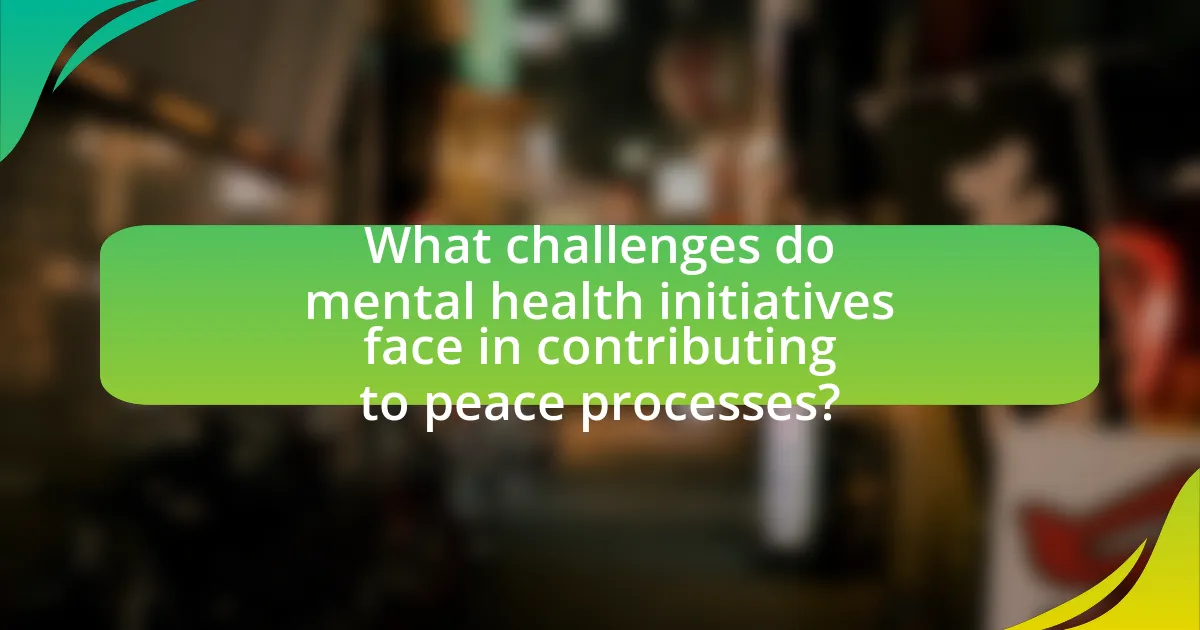
What challenges do mental health initiatives face in contributing to peace processes?
Mental health initiatives face significant challenges in contributing to peace processes, primarily due to stigma, lack of funding, and insufficient integration into broader peacebuilding frameworks. Stigma surrounding mental health often prevents individuals from seeking help, which limits the effectiveness of initiatives aimed at promoting mental well-being in conflict-affected areas. Additionally, mental health programs frequently struggle with inadequate funding, which hampers their ability to provide comprehensive services and support. Furthermore, these initiatives are often not fully integrated into existing peacebuilding efforts, leading to fragmented approaches that fail to address the psychological needs of affected populations. These challenges hinder the potential of mental health initiatives to foster resilience and contribute meaningfully to sustainable peace.
What barriers exist in implementing mental health initiatives in conflict zones?
Barriers in implementing mental health initiatives in conflict zones include lack of security, inadequate funding, cultural stigma, and limited access to trained professionals. Security concerns often hinder the delivery of services, as ongoing violence can prevent mental health workers from reaching affected populations. Inadequate funding restricts the development and sustainability of programs, as many initiatives rely on external support that may be inconsistent. Cultural stigma surrounding mental health issues can discourage individuals from seeking help, as mental illness may be viewed negatively in certain communities. Additionally, the scarcity of trained mental health professionals in conflict-affected areas limits the capacity to provide necessary care, with reports indicating that many regions have fewer than one mental health worker per 100,000 people.
How do cultural perceptions of mental health impact these initiatives?
Cultural perceptions of mental health significantly influence the effectiveness of mental health initiatives in peace processes. In cultures where mental health issues are stigmatized, individuals may be less likely to seek help, undermining the goals of these initiatives. For instance, a study published in the “International Journal of Social Psychiatry” found that stigma surrounding mental illness can lead to lower participation rates in mental health programs, which are crucial for building resilience in conflict-affected communities. Additionally, cultural beliefs about mental health can shape the types of interventions that are accepted and utilized, as seen in various regions where traditional healing practices are preferred over Western psychological approaches. This highlights the necessity for mental health initiatives to be culturally sensitive and tailored to local beliefs to enhance their acceptance and effectiveness.
What logistical challenges hinder the effectiveness of mental health programs?
Logistical challenges that hinder the effectiveness of mental health programs include inadequate funding, insufficient trained personnel, and lack of access to services. Inadequate funding limits the resources available for program implementation and sustainability, often resulting in reduced service availability. Insufficient trained personnel affects the quality of care provided, as there may not be enough qualified professionals to meet the demand for mental health services. Additionally, lack of access to services, particularly in rural or underserved areas, prevents individuals from receiving necessary support, thereby diminishing the overall impact of mental health initiatives. These challenges are documented in various studies, including the World Health Organization’s report on mental health systems, which highlights the critical need for improved infrastructure and resources to enhance program effectiveness.
How can these challenges be overcome to enhance the impact of mental health initiatives?
To enhance the impact of mental health initiatives, challenges can be overcome by integrating community-based approaches that prioritize local needs and cultural contexts. Research indicates that initiatives tailored to specific communities, such as the World Health Organization’s Mental Health Action Plan, demonstrate improved engagement and effectiveness. Additionally, increasing funding for mental health services and training local professionals can address resource gaps, as evidenced by studies showing that trained community health workers significantly improve mental health outcomes in underserved populations. Implementing these strategies fosters resilience and strengthens the overall effectiveness of mental health initiatives in peace processes.
What best practices can be adopted to improve mental health initiatives in peace processes?
To improve mental health initiatives in peace processes, integrating community-based approaches is essential. Community involvement fosters trust and ensures that mental health services are culturally relevant and accessible. Evidence shows that programs like the World Health Organization’s Mental Health Gap Action Programme have successfully reduced stigma and increased service utilization in conflict-affected areas. Additionally, training local health workers in psychological first aid enhances the capacity to address mental health needs effectively. Research indicates that such localized strategies lead to better outcomes in mental health support during peacebuilding efforts.
What practical steps can individuals take to support mental health initiatives in their communities?
Individuals can support mental health initiatives in their communities by volunteering with local mental health organizations. Engaging in volunteer work allows individuals to contribute their time and skills to programs that provide essential services, such as counseling, support groups, and educational workshops. Research indicates that community involvement in mental health initiatives can lead to improved mental well-being for both volunteers and those they assist, fostering a supportive environment that promotes resilience and recovery. Additionally, individuals can advocate for mental health awareness by participating in campaigns and events that aim to reduce stigma and increase access to mental health resources, which is crucial for building a community that prioritizes mental health.
